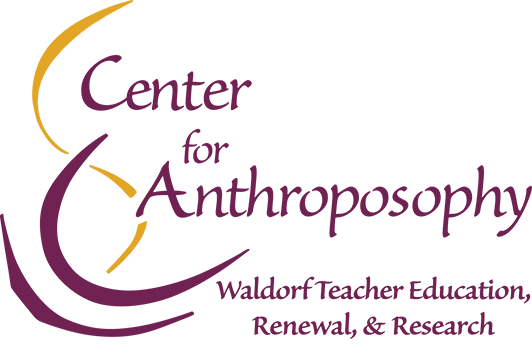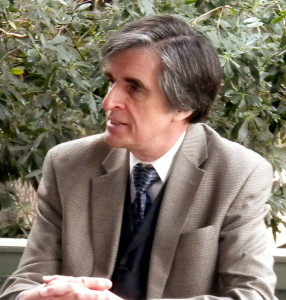 A wise observer of human affairs once observed: “War is a function of those who think in twos; peace is made by those who think in threes.”
A wise observer of human affairs once observed: “War is a function of those who think in twos; peace is made by those who think in threes.”
When two groups are spanned by some shared overarching edifice-be it a bridge, an idea, a common exploration, or a spiritual training involving two different cultures and conducted in two different languages-the conflict inherent in duality is overcome by a transcendent third reality that serves to unite, rather than divide, them.
In this issue, you may find many examples of this dynamic. At a minimum, one can take heart from its potent and peace-bestowing efficacy.
Douglas Gerwin, Director
Center for Anthroposophy
![]()
Dateline Sao Paulo Brazil: Peacock Feathers for a Flock of High School Teachers
Four years ago, the Center for Anthroposophy opened a satellite of its high school teacher training program at the oldest Waldorf school in Brazil. Douglas Gerwin, who initiated the program, reports on its recent culmination and closing ceremony.
Colleagues are sometimes surprised to learn there are more Waldorf schools in Brazil than in the entire rest of South and Central America taken together. With 35 schools–eight of them with complete high schools–Brazil easily outstrips Argentina (14), Chile (4), Peru (3), and Uruguay (1), as well as three officially recognized Waldorf schools in Central America. (Mexico, as a member of the Association of Waldorf Schools of North America, lists its 13 Waldorf member schools as part of the North American tally.)
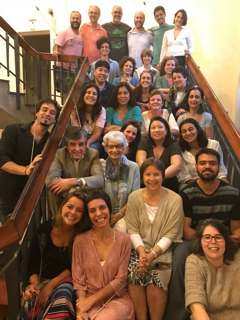 As in many parts of the world, Brazil is home to several programs for training teachers, but none specializing in the preparation of high school faculty. It was for this reason I was asked by the leadership of Sao Paolo’s Escola Rudolf Steiner–the first and largest Waldorf school in Brazil, with over 800 students–to organize a program specifically for their high school subject teachers.
As in many parts of the world, Brazil is home to several programs for training teachers, but none specializing in the preparation of high school faculty. It was for this reason I was asked by the leadership of Sao Paolo’s Escola Rudolf Steiner–the first and largest Waldorf school in Brazil, with over 800 students–to organize a program specifically for their high school subject teachers.
Starting in 2014, we launched a three-tiered program of courses, seminars, and regional study groups. Leonore Russell, a eurythmist who had been part of the founding of the high school training program inaugurated by the Center for Anthroposophy back in 1996, joined me along with Michael D’Aleo, a science and math teacher who also teaches in CfA’s high school program in New Hampshire. Twice a year, two of us took turns traveling to Sao Paolo to lead week-long courses in pedagogical, artistic, and subject-specific discussions; for one of these visits, Marke Levene stepped in as eurythmist and teacher of projective geometry.
In between these bi-annual sessions, the Brazilian trainees–most of them already teaching in schools–met on weekends for seminars and further artistic practice with local experienced faculty organized by Suely Lima and Henriqueta Cristina Rodovalho, two dedicated high school English teachers at Escola Waldorf Rudolf Steiner who oversaw our program at their end, along with Walkyria Machado, the school’s tireless administrator.
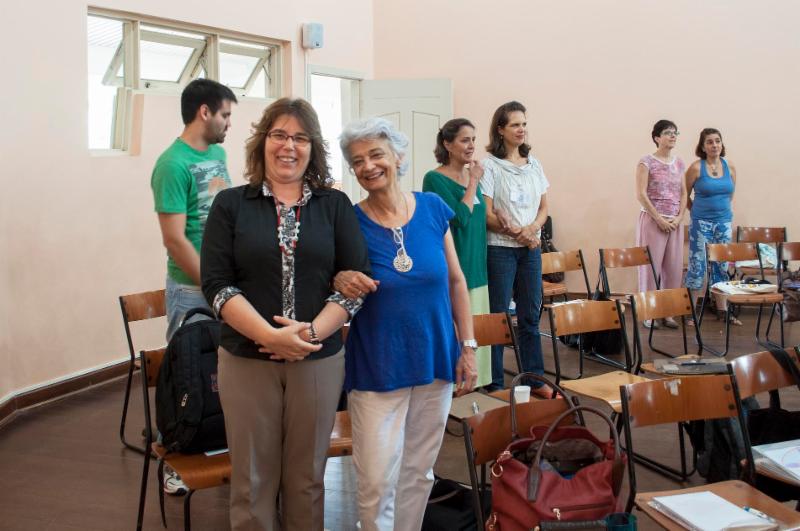
In an act of generosity so typical of the Brazilian culture, the trustees of the Sao Paolo school made this training program available to Waldorf high school teachers throughout the country at very low cost. In all, some 32 teachers–10 men and 22 women–completed this four-year program. A handful of them even opted to extend their studies by joining CfA’s high school teacher training program this summer in Wilton, New Hampshire so that they could have more time and mentoring for their independent research projects.
On the closing day last February of our Brazilian program, we all sat in a circle to share retrospective impressions and appreciations. As only Brazilians can do, there was lively syncopated singing, improvised salsa band (Leonore and I holding up the percussion section), and some poignant pieces of eurythmy performed with all of us dressed entirely in white robes.
As a final parting gesture, I handed to each participant a slender peacock Peacock feathers. Peacock. Carnival. feather which I had brought with me on the plane from the United Sates as hand luggage. According to legend, these feathers are a talisman for all-seeing knowledge and vigilance in thinking, for patience and compassion in feeling, and for good will and the capacity to “transform the venom of snakes into solar iredescence”. These, I felt, were important qualities to acknowledge and encourage in high school teachers!
A footnote to our visits:
After many years of dogged negotiating, the leadership of the Escola Waldorf Rudolf Steiner finally won the permission of the Brazilian authorities to start the country’s first officially recognized anthroposophical university this year. This institution will be allowed to grant undergraduate and graduate degrees in anthroposophical studies, as well as advanced certificates in Waldorf teacher education, among other specialized professions.
In preparation for this new venture, the imposing three-storey high school wing of the school was completely renovated and outfitted with electronic teaching tools–air conditioning, as well–and will now serve both as upper school classes during the day and as a college campus in the evenings and on weekends. It is hoped that eventually this university will be able to offer Brazilian Waldorf schools its own high school training program, rather than making them reliant on North American “imports”. We were assured, however, that our approach to teacher training would strongly influence the way they shape their own program.
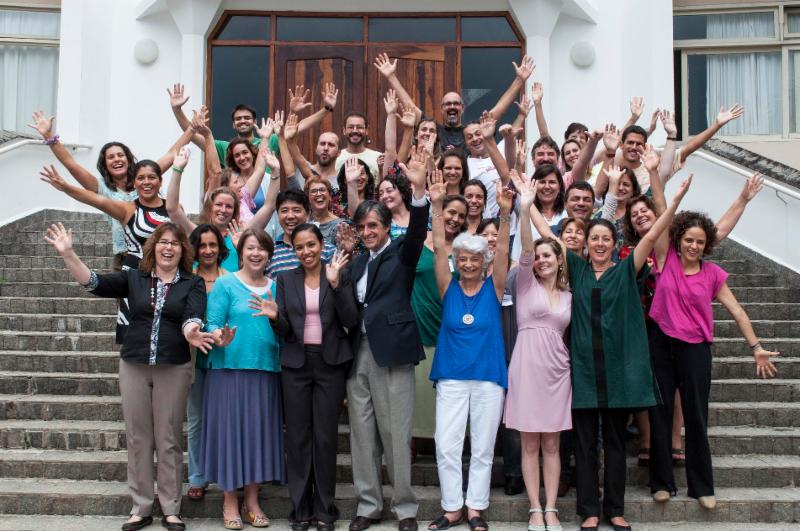
![]()
Dateline Wilton NH: Community Needs Renewal — and Vice Versa
Karine Munk Finser, Director of CfA’s popular Renewal Courses, reports on the latest line up of star-studded seminars and workshops for the coming summer season.
Dear Friends,
In meeting one another our destiny paths are enkindled. How else can we gain access to the courage we need to teach or to start every day anew?
At the core of our Renewal Courses is the human encounter; that is why we offer these one-week courses each summer. Sitting alone at home studying texts or watching videos is not enough; it is participation in a human community that helps us to grow our wings, to trust ourselves, and to continue to develop new capacities.
Again this year we will bring courses to help and support teachers and those who work with them in schools during this summer season of transition, so that they can breathe out the school year and take some time for self-rejuvenation before entering the autumn months with new insights, rich encounters, and fresh joy of heart. We welcome teachers, assistants, administrators, parents, board members, artists, therapists, and philosophers for five days during which they can share time in a summer community dedicated to deepening anthroposophical study and practice.
Details of our courses are listed in our 2018 brochure of Renewal Courses.
In addition, a short video of this program captures the rich course content and mood on campus.
For the remainder of May participants can still register without a late registration fee, which takes effect as of June 1st. Early registrants will have an easier time finding room on campus or close by in our friendly community. There are also options for hotels, B&B’s, and camping in our region. Contact MaryLyn Yonika by e-mail at ml@centerforanthroposophy.org or by phone at (603) 654-2566 for details.
It is important to remember that courses are cancelled if there is insufficient sign-up.
This year, thanks to scholarships offered by our donors, we can offer reduced tuition for those attending both weeks of our Renewal Courses. Groups of three registrants from the same institution, along with full-time faculty, are eligible for scholarship based on need, while funds last. We are grateful to our donors for making this possible once again.
In Week I of our program–from Sunday June 24th to Friday June 29th–we will have daily short morning lectures by Christof Wiechert, who will also offer us the keynote on the opening night. Here are his lecture titles:
- Aspects of the evolution of consciousness needed to understand the requirements of education in the 21st century
- The 9th century and the change from trichotomy to dichotomy
- The 15th century and the destination of some streams in karmic
relations - The 19th century and the battle for freedom
- The 21st century and the destiny of Anthroposophy
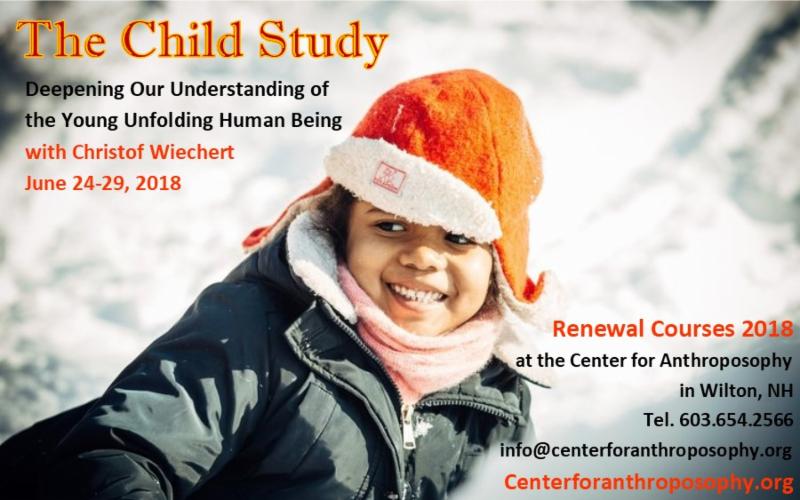
During this first week, teachers will share meaningful conversations in smaller facilitated groups, focusing on challenges and opportunities as we prepare for the centennial of Waldorf education. An Artistic Soirée and a community Contra Dance will take place early in the week this year, and participants are invited to bring a song, a poem, some instrumental music, or other artistic offering before the start of the dance, led by Christopher Sblendorio, our caller and accordionist, and David Gable on the fiddle. Roberto Trostli, who will be on campus to teach 6th, 7th, and 8th grades science classes, will also offer an evening lecturer entitled “Thy Will be Done: The Task of the College of Teachers in Waldorf Schools”.
Finally, on our last full day together we will celebrate with an evening of eurythmy entitled “Come Unto These Yellow Sands”, performed by two members of the Spring Valley ensemble, Ivilisse Esguerra and Clifford Venho, together with Barbara Renold and a local pianist.
Week II of our program–from Sunday July 1st to Friday July 6th–will kick off with a keynote address by Michael D’Aleo. In addition there will be two further lectures during this week: one by Brian Gray on the theme of “Wolfram’s Parzival as Zodiacal Path to the Grail”, the other by Lakshmi Prasanna on the theme “Meet Me Who I Am: Children on the Autism Spectrum”. We will have an evening of music and end the week with a Drama event: The Refugees Tale, based on Goethe’s Green Snake parable, performed by Glen Williamson and Laurie Portocarrero.
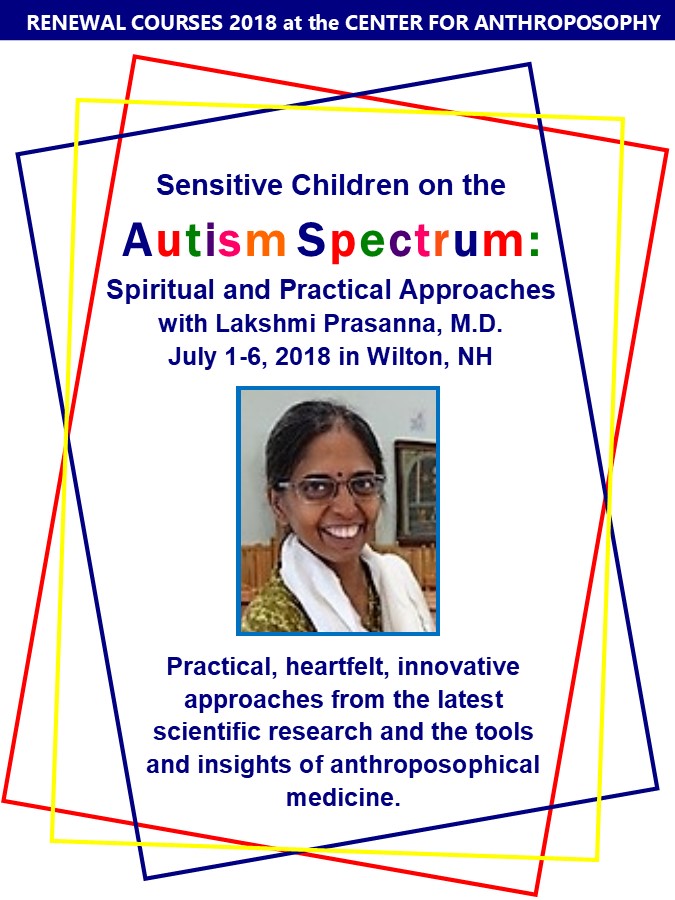
We are delighted to welcome you (back) to our beautiful summertime campus at High Mowing School in Wilton, New Hampshire. Meanwhile, we wish you a very happy Spring!
Warm wishes,
Karine Munk Finser
Director of Renewal Courses
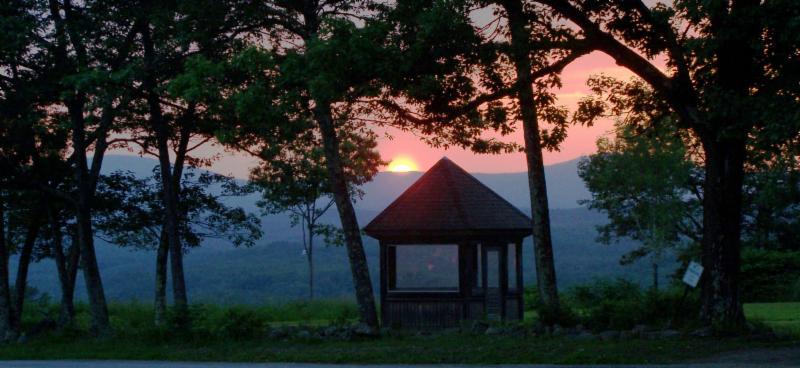
![]()
Dateline Asheville/Chapel Hill NC: “Explorations” of Anthroposophical Landscapes
A new arts-based program is starting up for adults wishing to explore the wide terrain of anthroposophical endeavors, including the foundational principles of Waldorf education. Here is a preview of this new venture.
During the course of this year, the Center for Anthroposophy (CfA) has undertaken a major redesign of what was formerly called Foundations Studies, resulting in a new program with a new name.
“Explorations: Workshops in the Arts and Contemplative Practices Based on the Work of Rudolf Steiner”–designed to be held in Waldorf communities across the continent–will feature a new three-tiered format comprised of:
- intensive weekend workshops with emphasis
- on the artsbi-monthly seminars to study anthroposophy
- monthly zoom webinars called “Windows on Waldorf”
A series of weekend workshops–starting Friday evening and lasting through Sunday lunchtime–will constitute the core or “hub” of this program, while the study and zoom seminars will serve as regional satellites in communities surrounding the central site of the “hub” program.
The weekend workshops–led by seasoned Waldorf teachers with long experience of teaching adults, including faculty from CfA and the Waldorf Teacher Education Program at Antioch University New England–will focus on artistic media such as drawing, painting, sculpture, speech, singing, as well as spacial dynamics and eurythmy, two new forms of artistic movement pioneered by Rudolf Steiner. The intervening study seminars, led by local facilitators, will devote their attention to some of the basic texts of Steiner and those who have come after him.
Though each program will be custom-designed to meet the needs of a local community, a typical sequence will includes 5-6 weekend workshops during the course of a school year, plus 10 seminar sessions scheduled between the weekend workshops.
Tuition for this year-long program will be set on a sliding scale ranging from $1,500 to $2,200, depending on the size of the group and its distance from CfA’s home base in New England. A minimum of 15 participants will be needed to launch this program.
For those intending to undertake teacher training, the Waldorf program at Antioch University New England will recognize a certificate of completion in CfA’s Explorations program as fulfilling part of Antioch’s entrance requirements.
If a community can gather 15 or more interested people, a member of the CfA faculty will visit that community to offer an information session/orientation event describing the program in more detail. For further information visit this page or contact us or call (603) 654-2566.
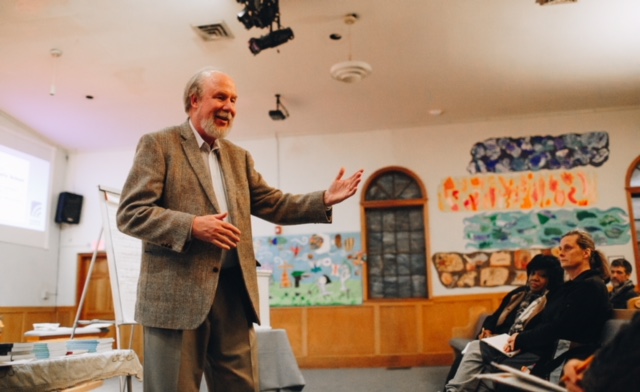
For the coming school year (2018-19) CfA is planning inaugural hubs of this program in Asheville NC, Chapel Hill NC, Jacksonville FL, and Washington DC. Torin Finser, CfA’s Director of Outreach and Program Development, recently visited Asheville to prepare for the launch of this program.
Here is a sample program for the Asheville hub (Click image to view PDF):
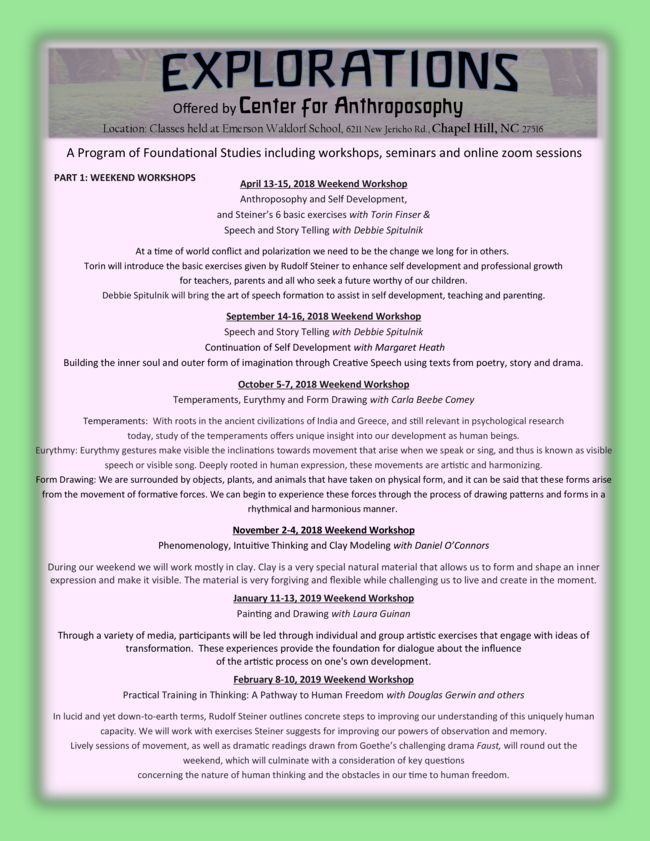
![]()
Dateline Denver CO/Sacramento CA: Building Bridges to Span a Continent
Even as the Denver cycle of CfA’s “Building Bridges” program for prospective teachers comes to completion, a new series of these workshops is taking shape in Sacramento CA. Here is a taste of what is offered in this year-long program.
In 2016 the Center for Anthroposophy (CfA), partnering with the Waldorf Program at Antioch University New England (AUNE), inaugurated “Building Bridges”, a new program intended for practicing teachers in public Waldorf and independent schools wishing to make the transition from local onsite foundational studies to an accredited Waldorf teacher training program.
The first program of this kind was offered in Anchorage AK. A second round of this one-year program was just completed in Denver CO, and during the coming school year a third cycle of this program will start at the Golden Valley Orchard School in Orangevale close to Sacramento CA.
Sessions are held over a long weekend approximately once per month, with a balance of artistic, philosophical, and practical aspects of Waldorf education. Those who complete the year and successfully apply to the Waldorf Program at AUNE may be considered for advanced standing in its summer sequence program, thus eliminating the first of three summer sessions held in Wilton, NH.
Philosophical and curricular content are complemented by artistic practice, including singing, recorder playing, eurythmy, drawing, speech, story telling, and painting. Faculty for this program are drawn from CfA and AUNE as well as from a pool of experienced teachers living locally.
Communities interested in hosting this program should contact Torin Finser, Director of Outreach and Program Development, at the Center for Anthroposophy. At present, CfA offers only one of these programs in any single year.

![]()
Dateline Fair Oaks, CA: A Piece about Peace
In his latest book, Education for Nonviolence: The Waldorf Way, Torin Finser outlines a Waldorf approach to the practice of nonviolence. Ronald Koetzsch, Editor of AWSNA’s twice-yearly magazine Renewal, penned the following book review, which he has graciously allowed us to reprint here.
Almost one hundred years ago, a few months after the end of World War I, Emil Molt, a factory director in Stuttgart, Germany, asked Rudolf Steiner a question: “Is there a form of education that will create human beings who will not make war?” Steiner answered in the affirmative. Molt then asked, “Will you help me create a school based on such an education?” Steiner again answered in the affirmative. Just months later, in September 1919, the first Waldorf school was opened and Waldorf education was born.
Torin Finser has served Waldorf education for over forty years, first as a class teacher, then as Director of the Waldorf Teacher Education Program at Antioch University New England, and later as Chair of Antioch’s Education Department. He is a widely known lecturer and consultant and author of nine other books.
In this very personal book, Finser circles back to the original intent in the founding of Waldorf education. Troubled by the morass of senseless violence into which humanity seems to be descending, Finser asks several very basic questions: What are the qualities of character that make a person nonviolent? How can we cultivate these qualities in our children and young people? What are the ways in which Waldorf education helps develop these qualities?
The book is far ranging, and Finser touches on many profound subjects. One chapter, titled “Evil”, asks and seeks to answer the question: What can we do to overcome evil? Another, simply titled “Boys”, deals in depth with the special challenges boys face in our society. It gives much valuable, practical advice to mothers, fathers, and teachers about how to help boys develop in a wholesome and moral way. There is also a chapter titled “Sustainability”, which deals with the difficulties Waldorf class teachers face today, fulfilling the awesome task they have taken on-educating a group of children from grade one through grade eight.
But the book’s underlying theme has to do with the aspects of Waldorf education that help children and young people become well-rounded, empathetic, compassionate, tolerant, kind, hospitable, self-sacrificing, and respectful adults. Along the way, Finser focuses on many of the distinctive aspects of life in a Waldorf school. In the chapter entitled “Character Education in Waldorf Education”, he cites factors that can help cultivate character in children and young people. These include:
- a sense of community
- a culture of collaboration and cooperation
- an age-appropriate curriculum
- daily exposure to nature
- limitation of use of electronic media
- crafts and practical skills that develop self-confidence
- individual attention-the treatment of each child as a unique “miracle”
- involvement in the arts, music, and drama as forms of self-expression
- exposure to the stories and traditions of many different cultures
- parental involvement
- an emotional intelligence and social curriculum through the grades
Two later chapters in the book focus on other key elements of Waldorf pedagogy: “Education of the Senses” and “Inclusive Recreation: Play”.
Finser’s conclusion is clear. Education–and, in particular, Waldorf education–is the best hope for creating nonviolent individuals and societies. But that is not enough. Finser also advocates for political activism regarding education and our responsibility toward children. At the very end, he presents “A Bill of Rights for Children”, which, ideally, would serve as a complement to the Bill of Rights contained in the first amendment to the United States Constitution.
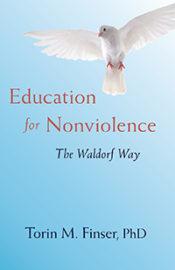
![]()
Dateline Wilton NH: Waldorf High School Program Comes of Age
Each summer for more than two decades, the Center for Anthroposophy has launched a new cycle of its Waldorf High School Teacher Education Program (WHiSTEP). Here is a brief preview of the subjects being featured this summer and of the 21st graduating group of high school teachers.
Launched by the Center for Anthroposophy (CfA) in July of 1996, the Waldorf High School Teacher Education Program–known to its friends as “WHiSTEP”–has been graduating high school teachers with certificates in Waldorf high school teaching as of 1998. Since its inception, some 185 students have completed this part-time three-summers program.
As of this year, WHiSTEP students or graduates are active in 34 of the 41 Waldorf high schools extant in North America, from the Hawaiian islands and the Pacific Northwest to the sultry Southeast and the rocky Atlantic coastline of Maine. In addition, small but growing contingents of high school teachers from Australia, China, Brazil, and Korea are taking part in the program this summer. Overall, around 65% of WHiSTEP’s current and graduated students are working full or part-time at some 60 Waldorf schools spread across six continents.
Sometimes we are asked: How many teachers does it take to constitute a full high school faculty? At the Center for Anthroposophy, we calculate that number as approaching 12 (give or take a few, depending on the size of the school): 3-4 for humanities including languages; 3-4 for sciences and math; 3-4 for arts and crafts, as well as athletics. These numbers do not include administrative and non-classroom positions such as college and guidance counselors, after-school coaches, and office staff.
Each summer, the Center’s high school program admits a new class of around 15 students–in other words, the equivalent of a full high school faculty–ranging across the subject specializations. This year we are offering specialized “subject seminars” in Arts and Art History, English and Literature, History and Social Science, Life Science and Earth Science, Mathematics, Physics and Chemistry. All of these summer courses are held on the two recently merged campuses of High Mowing School and Pine Hill Waldorf School in Southeastern New Hampshire.
About a dozen teachers from across the country have already been accepted into the latest cycle of this month-long summer program, which includes seminars, artistic ateliers, and subject-specific workshops. The latest group of teachers–most of them already active in the classroom–will be studying with close to a hundred trainees in the Waldorf elementary teacher education program of Antioch University New England.
A few are joining with the intention of securing a fully-accredited Masters degree in Waldorf high school teaching from Antioch as part of an option introduced three years ago. The first high school teacher to have taken advantage of this new offering is scheduled to complete her course work this summer. She is slated to graduate with CfA’s Class of 2018, the high school program’s 21st graduating group.
This summer’s cycle of the high school program starts on Sunday 1 July 2018 and runs until Saturday 28 July. For details about application, contact Douglas Gerwin at the Center for Anthroposophy.
![]()
Dateline Wilton NH:A “Who’s [Directing] Who” at the Center for Anthroposophy
With the introduction of new programs and initiatives, the leadership of the Center for Anthroposophy has been reconfigured. Here is the present line-up
With the advent of two new educational programs inaugurated by the Center for Anthroposophy, CfA’s Executive Committee has decided to reconfigure the line-up and titles of its leadership positions. As of this calendar year, Torin Finser will take charge of CfA’s Explorations and Building Bridges programs as well as continuing his development work for the Center. Other leadership positions remain largely unchanged, through their job descriptions and titles will be modified to reflect changing responsibilities.
Current CfA positions:
- Douglas Gerwin,Executive Director & Chair of the Waldorf High School Teacher Education Program
- Torin Finser, Director of Outreach and Program Development
- Karine Munk Finser, Director of Renewal Courses
- Lisl Hofer, Manager of Renewal Courses
- Milan Daler, Administrator
- MaryLyn Yonika, Administrative Assistant
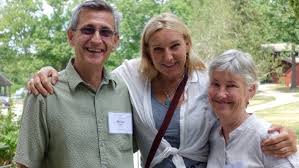
![]()
